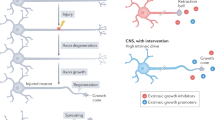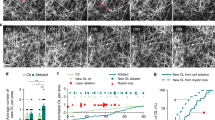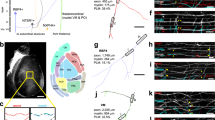Abstract
Recovery from demyelinating events in the adult central nervous system (CNS) may depend in some situations on the generation, by cell division, of new oligodendrocytes (ODCs)1. Adult ODCs, identified by morphological criteria, have been shown to divide in vivo in response to induced demyelination or to physical trauma2,3, although the factors that elicit this response are unknown. Adult ODCs do not proliferate in vitro under normal conditions (ref. 4 and P.M.W., unpublished observations). Encouraged by observations that axons provide a mitogenic stimulus for Schwann cells5,6 and support the proliferation of embryonic ODC progenitors7, we have studied the response of adult ODCs, identified by immunocytological criteria, to axons of dorsal root ganglion neurones in culture. We have now found that adult ODCs proliferate in vitro when neurones are present but not when neurones are absent, suggesting that neurones can elicit ODC division under the conditions prevailing in our culture system.
This is a preview of subscription content, access via your institution
Access options
Subscribe to this journal
Receive 51 print issues and online access
$199.00 per year
only $3.90 per issue
Buy this article
- Purchase on Springer Link
- Instant access to full article PDF
Prices may be subject to local taxes which are calculated during checkout
Similar content being viewed by others
References
Ludwin, S. in Demyelinating Disease; Basic and Clinical Electrophysiology (eds Waxman, S. G. & Ritchie, J. M.) 123–168 (Raven, New York, 1981).
Arenella, L. & Herndon, R. M. Archs Neurol. 41, 1162–1165 (1984).
Ludwin, S. Lab. Invest. 52, 29–30 (1985).
Wood, P., Szuchet, S., Williams, A. K., Bunge, B. P. & Aranson, B. G. W. Trans. Am. Soc. Neurochem. 14, 212 (1983).
Wood, P. & Bunge, R. P. Nature 256, 662–664 (1975).
Salzer, J. & Bunge, R. P. J. Cell. Biol. 84, 739–752 (1980).
Wood, P. & Williams, A. K. Devl Brain Res. 12, 225–241 (1984).
Ranscht, B., Clapshaw, P. A., Price, J., Noble, M. & Seifert, W. Proc. natn. Acad. Sci. U.S.A. 79, 2709–2713 (1982).
Bologna-Sandru, L. et al. Brain Res. 210, 217–229 (1981).
Jessen, K. R., Morgan, L., Brammer, M. & Mirsby, R. J. Cell Biol. 101, 1135–1143 (1985).
Salzer, J., Bunge, R. P. & Glaser, L. J. Cell Biol. 84, 767–774 (1980).
Cassel, D., Wood, P. M., Bunge, R. P. & Glaser, L. J. cell. Biochem. 18, 433–446 (1982).
DeVries, G. H., Minier, L. N. & Lewis, B. L. Devl Brain Res. 9, 87–93 (1983).
Ratner, N., Bunge, R. P. & Glaser, L. J. Cell Biol. 101, 744–754 (1985).
Author information
Authors and Affiliations
Rights and permissions
About this article
Cite this article
Wood, P., Bunge, R. Evidence that axons are mitogenic for oligodendrocytes isolated from adult animals. Nature 320, 756–758 (1986). https://doi.org/10.1038/320756a0
Received:
Accepted:
Issue Date:
DOI: https://doi.org/10.1038/320756a0
This article is cited by
-
Do oligodendrocytes divide?
Neurochemical Research (1996)
-
Myelin gene expression in glia treated with oligodendroglial trophic factor
Journal of Neurocytology (1995)
-
Myelin basic protein does not have a mitogenic effect on adult oligodendrocytes
Acta Neuropathologica (1995)
-
Problems encountered when immunocytochemistry is used for quantitative glial cell identification in autoradiographic studies of cell proliferation in the brain of the unlesioned adult mouse
Cell and Tissue Research (1994)
-
Oligodendroglial progenitor cells but not oligodendroglia divide during normal development of the rat cerebellum
Journal of Neurocytology (1991)
Comments
By submitting a comment you agree to abide by our Terms and Community Guidelines. If you find something abusive or that does not comply with our terms or guidelines please flag it as inappropriate.



